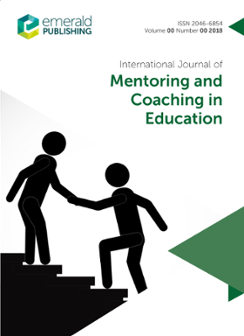International Journal of Mentoring and Coaching in Education
Issue(s) available: 46 – From Volume: 1 Issue: 1, to Volume: 13 Issue: 1

Peer mentors' experiences in an online STEM peer mentoring program: “beacons of light”
Jillian L. Wendt, Vivian O. JonesRacially and ethnically minoritized (REM) women continue to be underrepresented in science, technology, engineering and mathematics (STEM) programs and careers. Peer mentoring is…
Non-directive team coaching in engineering education to strengthen teamwork competencies
Ramiro García-Galán, Isabel Ortiz-Marcos, Rafael Molina-SánchezTeamwork is necessary for engineering to address today’s complex challenges. Therefore, team members must improve their teamwork competencies for more significant team development…
Advancing scholarly excellence at midcareer: the influence of exceptional others on faculty professional growth
Meghan J. Pifer, M. Cynthia Logsdon, Maria Ibarra, Kevin GardnerThere is a need to support midcareer faculty who have demonstrated scholarly success but require additional development. The purpose of this study was to explore the effects of an…
Using the “most significant change” technique to evaluate the teaching competence and psycho-emotional development of prospective teachers during the teaching practicum
Marios Koukounaras-Liagkis, Evdokia Karavas, Manolis PapaioannouThis paper presents the results of empirical research on the effects of teaching practice on student teachers’ teaching competence and psycho-emotional development using the “most…
The benefits of being a mentor teacher in a teacher residency program
Ji Hyun Oh, Jennifer A. Tygret, Sylvia L. MendezThis instrumental case study (Stake, 1995) explores the benefits experienced by mentor teachers who mentored resident teachers in a year-long residency program.
Students' learning outcomes from being a mentor in the Nightingale Mentoring Programme for Adult Refugees in Norway
Anne Margrethe Glømmen, Beate Brevik Sæthern, Rikard ErikssonThis study aimed to identify and describe how mentoring influences the mentor, by operationalising and specifying learning outcomes involved in mentoring.
Black students’ experiences of coaching and mentoring in higher education: a case study
Jennifer Hillman, Dave Lochtie, Olivia PurcellIn this case study, we offer an analysis of feedback from a student experience survey completed by Black undergraduate students who received proactive, targeted coaching and…
Whether and how coaching for mental health and well-being should be offered in post-Covid-19 pandemic Dutch higher vocational education: coaches’ perceptions
Tatiana CiffIn this article, the outcomes of a survey aimed to investigate how aware of and how capable coaches in higher vocational Dutch education perceive themselves to assist students…
Mentoring preparation in educational contexts: a review of the literature
Kate ThorntonThis article aims to contribute to a clearer understanding of the importance of mentor preparation and provide recommendations for effective mentor preparation programmes based on…
Vocational education and training in South Africa: leaders' perceptions of a mentoring framework in a professional development programme
Katharina Prummer, Salomé Human-Vogel, Daniel PittichThe South African vocational education and training (VET) sector is required by legislation to redefine postsecondary education, advance industrialisation and expand the job…
Physical education mentors in initial teacher training: who cares?
Luke Jones, Steven Tones, Gethin Foulkes, Andrew NewlandThe broad aim of this paper is to use Noddings' theory of ethical care to analyse mentors' caring experiences. More specifically, it aims to analyse how physical education (PE…
Learning to expand our communities to support coaching for equity: a collaboration of seven university-based teacher preparation programs
Elizabeth Ries, Erica Steinitz Holyoke, Heather Dunham, Murphy K. Young, Melissa Mosley Wetzel, Criselda Garcia, Katherina Payne, Annie Garrison Wilhelm, Veronica L. Estrada, Alycia Maurer, Katie TrautmanThere is an urgent need for teacher preparation programs to equip teachers to teach in innovative and transformative ways, meeting the needs of diverse learners. Coaching is an…
Navigating the landscape of academic coaching: a comprehensive bibliometric analysis
Somayeh Mahdi, Hassanreza Zeinabadi, Hamidreza Arasteh, Hossein AbbasianAcademic coaching (AC) has gained a significant attention to support student success and achievement in higher education, management and psychology. This study aimed to conduct a…
ISSN:
2046-6854Online date, start – end:
2012Copyright Holder:
Emerald Publishing LimitedOpen Access:
hybridEditor:
- Prof Andrew Hobson
